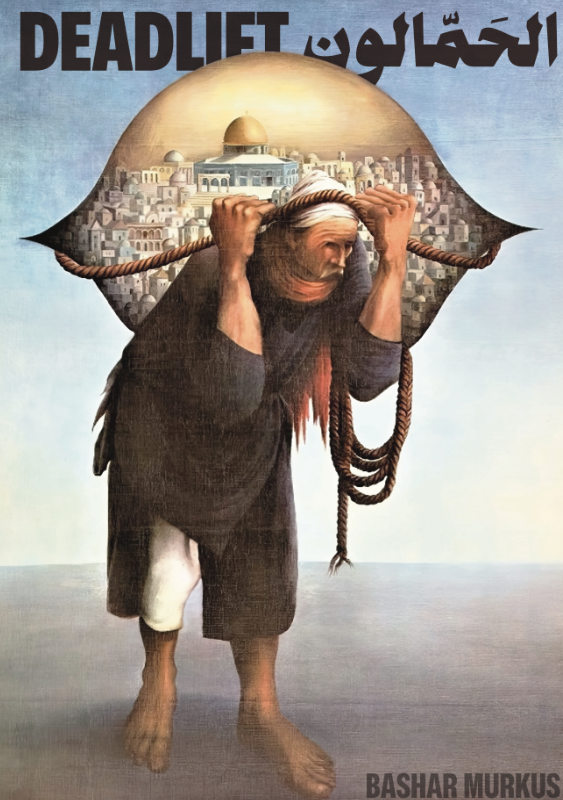Al-Harah Theater, Boy Jonkergouw Producties en Riksteatern
Bashar Murkus - DEADLIFT الحَمّالون
2025
Conceived Visualised and directed by Bashar Murkus, Performers: Ehab Abed, Wajdi Khalid, Reem Talhami, Nicola Zreineh Scenography: Nancy Mkaabal and Bashar Murkus Music: Wouter de Belder Light Design: Simon Haen Technical Direction & Set Production: Issam Rishmawi, Simon Haen
Executive Production: Admira Fazlic, George Matar Director Assistant: Hadil Khateb Management Assistant: Mostafa Betaree Advisor Internationalization: Nan van Houte Sales in the Netherlands: Boy Jonkergouw Producties Produced by Al Harah Theatre and Boy Jonkergouw Producties & Riksteatern Producers: Boy Jonkergouw & Marina Barham Partners: Podium LUX, PAX, Spotlight Team international art
Funded by: AFAC, The Danish House in Palestine and Riksteatern
A Visual Performance by Bashar Murkus
A Palestinian-Dutch co-production about human resilience
New York, Avignon, Dublin: the intense, cinematic theatre work of Palestinian director Bashar Murkus has a global impact. His new performance, DEADLIFT, is a unique collaboration between the Palestinian theatre company Al-Harah from Palestine, Boy Jonkergouw Producties from the Netherlands and the Swedish Riksteatern.
Murkus draws inspiration from a painting by Palestinian painter Suleiman Mansour, Jamal Al Mahamel, which depicts a man carrying an entire city (Jerusalem) on his back. In DEADLIFT, Murkus explores how much a person can bear. Where is the breaking point? When does the struggle against destruction turn into an act of destruction? Featuring a Palestinian cast of performers, DEADLIFT presents a poetic tribute to the resilience of people in distress.
Al-Harah is dedicated to building and maintaining a society that emphasizes human rights, democracy, and freedom of expression. Boy Jonkergouw Producties, creates, produces and presents cultural expressions and educational programs focused on human rights and social justice.
A contextual side program to the show will be presented by PAX Peace Organization and Podium LUX
A Word from the Director
It is impossible to write a synopsis for this performance. It simply cannot be done.
I write these words as Bashar Murkus, the creator of this work, after being commissioned by Al-Harah Theater, in partnership with Boy Jonkergouw Producties, with a remarkable mission: to create a theatrical piece in dialogue with the works of Palestinian painter Suleiman Mansour, one of Palestine’s most prominent artists and the creator of its most enduring symbols. I was to begin with his painting Camel of Burdens—a portrait of a porter carrying an entire city on his back.
No sooner had I agreed to the project than the genocide committed by the Israeli occupation against Gaza —erupted once again, and it continues unabated as I write these words. What city do we carry in this performance, when our cities are being erased and our souls collapse with them? How can we embody a porter who endures the burden while our people die and we stand by, merely watching?
In this visual performance, I place my outcry, my shame, my fear, and my questions. This may not make for a perfect synopsis, but it has made for a performance bristling with questions—testing the limits of the human body’s endurance, and trying, from a heap of rubble, to piece together questions about the future. Not only the future of Palestine.
What does the rubble teach us?
Conceived Visualised and directed by Bashar Murkus, Performers: Ehab Abed, Wajdi Khalid, Reem Talhami, Nicola Zreineh Scenography: Nancy Mkaabal and Bashar Murkus Music: Wouter de Belder Light Design: Simon Haen Technical Direction & Set Production: Issam Rishmawi, Simon Haen
Executive Production: Admira Fazlic, George Matar Director Assistant: Hadil Khateb Management Assistant: Mostafa Betaree Advisor Internationalization: Nan van Houte Sales in the Netherlands: Boy Jonkergouw Producties Produced by Al Harah Theatre and Boy Jonkergouw Producties & Riksteatern Producers: Boy Jonkergouw & Marina Barham Partners: Podium LUX, PAX, Spotlight Team international art
Funded by: AFAC, The Danish House in Palestine and Riksteatern

